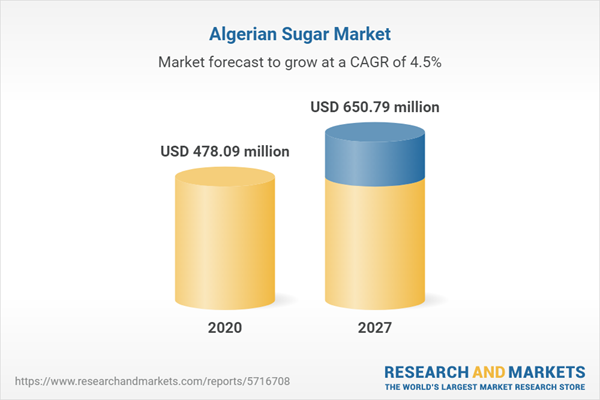Due to people consuming more food and beverages with added sugar these days the usage and demand for sugar have increased which is will play a role in the growth of the market. Also, these days people are preferring brown sugar over white sugar, which will bolster the demand for brown sugar and fuel the market growth further. Although some people are shifting to artificial sweeteners or low-calorie sugar which can restrain the market, Additionally, increasing investment and product innovation by major players coupled with new product launches may further bolster the growth of the market.
Trade in the Market
According to data by OEC, in 2020, Algeria exported a value worth USD 200 million in raw sugar, making it the 20th largest exporter of raw sugar globally. In the same year, raw sugar was the 6th most exported product in the country. The primary countries that received the exports of raw sugar from Algeria in 2020 were Jordan, Mauritiana, and Turkey.Further, according to OEC, in 2020, the country imported a value worth USD 670 million in raw sugar, making it the 6th largest importer of global importer of raw sugar. In the same year, raw sugar was the 5th most imported product in the country. The major countries from where Algeria imports its raw sugar included Brazil, Germany and Netherlands. However, in March 2022, the government of Algeria implemented a ban on the export of foodstuffs that it imports, which included sugar, thus prohibiting its further export.
Online channels to grow substantially
According to the ITA (International Trade Association), more than 90% of online transactions are to pay telephone and internet bills. According to the trade group GIE Monétique, there were 105 online retailers in Algeria by the end of June 2021, that processed 3.5 million payments worth USD 32.4 million in the first half of 2021. Further, according to the Algerian National Association of Traders and Craftsmen, the market potential is estimated to be USD 5 billion. The government has also been seeking to increase the rate of Internet penetration and bandwidth to boost e-commerce in the country. Thus, the growth in e-commerce in the country is expected to boost the online channels of distribution as well. While the first Algerian online markets appeared back in 2009, e-commerce began to take off successfully in 2014 with the arrival of the Pan-African site Jumia, which still remains the country’s most popular online sales site.Further, according to DataReportal, there were about 27.28 million internet users in Algeria in January 2022, showing an increase of 7.3% between 2021 and 2022. Further, according to the data, internet penetration in the country stood at 60.6% in January 2022, with the number of mobile connections at a staggering 103.5% of the total population. Thus, this growing internet population in the country is further projected to drive the online channel of distribution in the projection period.
Restraints
People in the country have been experiencing a shift in their eating habits and growing diet consciousness, thus decreasing their sugar intake. This factor is expected to constrain the growth of the market.COVID-19 Insights
The outbreak of the COVID-19 pandemic affected the market negatively. The pandemic resulted in the implementation of nationwide lockdowns and social distancing measures in the country, which affected the production, as well as the distribution of the crops to obtain sugar. Further, the lockdowns also mandated the shutdown of offline retail stores in the country, which are still a major source of distribution, thus making the market dip even further.Market Segmentation:
- By Form
- Granulated
- Powdered
- Syrup
- By Source
- Cane Sugar
- Beet Sugar
- By Use
- Food and Beverage
- Pharmaceuticals
- By Distribution Channel
- Online
- Offline
Table of Contents
1. INTRODUCTION1.1. Market Overview
1.2. Covid-19 Scenario
1.3. Market Definition
1.4. Market Segmentation
2. RESEARCH METHODOLOGY
2.1. Research Data
2.2. Assumptions
3. EXECUTIVE SUMMARY
3.1. Research Highlights
4. MARKET DYNAMICS
4.1. Market Drivers
4.2. Market Restraints
4.3. Porter's Five Forces Analysis
4.3.1. Bargaining Power of End-Users
4.3.2. Bargaining Power of Buyers
4.3.3. Threat of New Entrants
4.3.4. Threat of Substitutes
4.3.5. Competitive Rivalry in the Industry
4.4. Industry Value Chain Analysis
5. ALGERIA SUGAR MARKET, BY FORM
5.1. Introduction
5.2. Granulated
5.3. Powdered
5.4. Syrup
6. ALGERIA SUGAR MARKET, BY SOURCE
6.1. Introduction
6.2. Cane Sugar
6.3. Beet Sugar
7. ALGERIA SUGAR MARKET, BY USE
7.1. Introduction
7.2. Food and Beverage
7.3. Pharmaceuticals
8. ALGERIA SUGER MARKET, BY DISTRIBUTION CHANNEL
8.1. Introduction
8.2. Online
8.3. Offline
9. COMPETITIVE ENVIRONMENT AND ANALYSIS
9.1. Major Players and Strategy Analysis
9.2. Emerging Players and Market Lucrativeness
9.3. Mergers, Acquisitions, Agreements, and Collaborations
9.4. Vendor Competitiveness Matrix
10. COMPANY PROFILES
10.1. Olam Group
10.2. Cevital
10.3. Promasidor Djazair
10.4. Kaoua Food
10.5. Shrijee
*List is not exhaustive
Companies Mentioned
- Olam Group
- Cevital
- Promasidor Djazair
- Kaoua Food
- Shrijee
Table Information
| Report Attribute | Details |
|---|---|
| No. of Pages | 82 |
| Published | December 2022 |
| Forecast Period | 2020 - 2027 |
| Estimated Market Value ( USD | $ 478.09 million |
| Forecasted Market Value ( USD | $ 650.79 million |
| Compound Annual Growth Rate | 4.5% |
| Regions Covered | Algeria |
| No. of Companies Mentioned | 5 |









